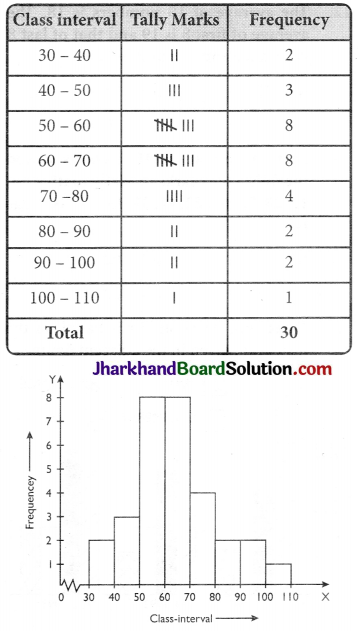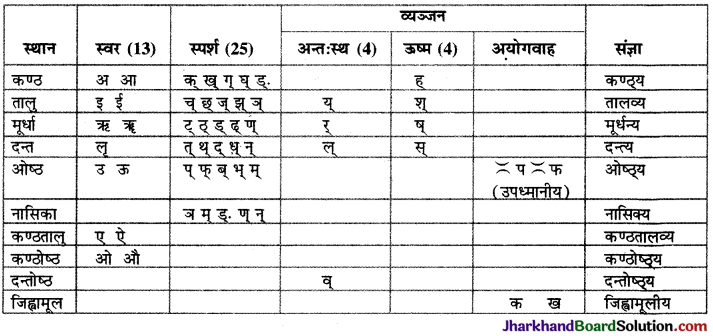Jharkhand Board JAC Class 10 Hindi Solutions Kshitij Chapter 14 एक कहानी यह भी Textbook Exercise Questions and Answers.
JAC Board Class 10 Hindi Solutions Kshitij Chapter 14 एक कहानी यह भी
JAC Class 10 Hindi एक कहानी यह भी Textbook Questions and Answers
प्रश्न 1.
लेखिका के व्यक्तित्व पर किन-किन व्यक्तियों का किस रूप में प्रभाव पड़ा?
उत्तर :
लेखिका के व्यक्तित्व पर उसके पिताजी और अध्यापक शीला अग्रवाल का विशेष प्रभाव पड़ा। उसके पिताजी ने उन्हें घर में होने वाली राजनीतिक सभाओं में भाग लेने के लिए प्रेरित किया। वह उनके साथ बैठकर सबके विचार सुनती है। उसके पिता साहित्य प्रेमी थे, इसलिए वह उनके पास रखी किताबें पढ़ती थी। लेखिका के पिता विचारशील व्यक्ति थे; लेखिका पर अनेक विचारों का विशेष प्रभाव पड़ा।
लेखिका जब कॉलेज गई, तो वहाँ पर हिंदी की अध्यापिका शीला अग्रवाल ने उसका साहित्य से वास्तविक परिचय करवाया। घर की राजनीतिक सभाओं से निकालकर देश की असली स्थिति से उसका परिचय करवाया। अध्यापिका शीला अग्रवाल के विचारों ने उसमें नया जोश और उत्साह भर दिया था, जिसने लेखिका को अपने विचारों को दूसरों के सामने व्यक्त करने के लिए प्रेरित किया।
प्रश्न 2.
इस आत्मकथ्य में लेखिका के पिता ने रसोई को ‘भटियारखाना’ कहकर क्यों संबोधित किया है ?
उत्तर :
लेखिका के पिता रसोई को ‘भटियारखाना’ कहते थे। उनके अनुसार रसोई वह भट्टी है, जिसमें औरतों की क्षमता और प्रतिभा झोंक दी जाती है।

प्रश्न 3.
वह कौन-सी घटना थी जिसके बारे में सुनने पर लेखिका को न अपनी आँखों पर विश्वास हो पाया और न अपने कानों पर?
उत्तर :
लेखिका जिस कॉलेज में पढ़ती थी, पिताजी के नाम उस कॉलेज के प्रिंसिपल का पत्र आया था। उसमें पिता जी से पूछा था कि लेखिका पर अनुशासनात्मक कार्यवाही क्यों नहीं की जाए? इसके लिए पिताजी को कॉलेज बुलाया गया था। उस पत्र को पढ़कर पिताजी आग लेखिका ने उनके नाम पर दाग लगा दिया है। वे लेखिका पर उबलते हुए कॉलेज पहँचे। उनके जाने के बाद लेखिका पड़ोस में जाकर बैठ गई, जिससे वह लौटने पर पिता के क्रोध से बच सके। परंतु जब वे कॉलेज से लौटे, तो बहुत प्रसन्न थे; चेहरा गर्व से चमक रहा था।
वे घर आकर बोले कि कॉलेज की लड़कियों पर उसका बहुत रौब है। पूरा कॉलेज तीन लड़कियों के इशारे पर खाली हो जाता है। प्रिंसिपल के लिए कॉलेज चलाना असंभव हो रहा है। पिताजी को उस पर गर्व है क्योंकि वह देश की पुकार के समय देश के साथ चल रही है, इसलिए उसे रोकना असंभव है। यह सब सुनकर लेखिका को न अपनी आँखों पर विश्वास हुआ था, न ही अपने कानों पर; परंतु यह वास्तविकता थी।
प्रश्न 4.
लेखिका की अपने पिता से वैचारिक टकराहट को अपने शब्दों में लिखिए।
उत्तर :
लेखिका के पिता दोहरे व्यक्तित्व के व्यक्ति थे। वे आधुनिकता के समर्थक थे। वे औरतों को केवल रसोई तक सीमित नहीं देखना चाहते थे। उनके अनुसार औरतों को अपनी प्रतिभा और क्षमता का उपयोग घर के बाहर देश की स्थिति सुधारने के लिए करना चाहिए। इससे यश, प्रतिष्ठा और सम्मान सबकुछ मिलता है। लेकिन जहाँ वे आधुनिक विचारों के समर्थक थे, वहीं दकियानूसी विचारों के भी थे।
उन्हें अपनी इज्जत प्यारी थी। जहाँ वे औरतों को रसोई से बाहर देखना चाहते थे, वहीं उन्हें यह भी बर्दाश्त नहीं होता था कि वह लड़कों के साथ स्वतंत्रता की लड़ाई में कदम-से-कदम मिलाकर चलें। वे औरतों की स्वतंत्रता को घर की चारदीवारी से दूर नहीं देखना चाहते थे, परंतु लेखिका के लिए पिताजी की दी हुई आज़ादी के दायरे में चलना कठिन था। इसलिए उसकी अपने पिता से वैचारिक टकराहट थी।
प्रश्न 5.
इस आत्मकथ्य के आधार पर स्वाधीनता आंदोलन के परिदृश्य का चित्रण करते हुए उनमें मन्नू जी की भूमिका को रेखांकित कीजिए।
उत्तर :
सन 1946-47 वह समय भारतीय स्वाधीनता आंदोलन का समय था। उस समय किसी के लिए भी घर में चप बैठना असंभव था: चारों ओर प्रभात-फेरियाँ, हड़तालें, जुलूस, भाषणबाजी हो रही थी। हर युवा, बच्चा और बूढ़ा अपनी क्षमता के अनुसार देश की स्वाधीनता में अपना योगदान दे रहा था। लेखिका के पिता ने घर में होने वाली राजनीतिक सभाओं में उसे अपने साथ बैठाकर देश की स्थिति से अवगत करवाया था।
उसमें देश की स्थिति को समझने तथा जोश के साथ कार्य करने का उन्माद उसमें उनकी अध्यापिका शीला अग्रवाल ने अपने विचारों से भरा। अध्यापिका शीला अग्रवाल के उचित मार्गदर्शन से मन्नू जी ने अपनी योग्यता के अनुसार स्वाधीनता आंदोलन में योगदान दिया। प्रभात-फेरियाँ निकालना, हड़तालें करवाना, कॉलेज में क्लासें बंद करवाना, छात्रों को इकट्ठा करके जुलूस के रूप में सड़कों पर निकलना, भाषणबाजी करना आदि कार्य उस समय मन्नू भंडारी ने किए। उस समय उनकी रगों में आज़ादी का लावा बह रहा था। उस लावे ने उसके अंदर के भय को समाप्त कर दिया था। इस तरह उस समय मन्नू भंडारी ने स्वाधीनता आंदोलन में बढ़ चढ़कर अपना योगदान दिया।
रचना और अभिव्यक्ति –
प्रश्न 6.
लेखिका ने बना लेखिका ने बचपन में अपने भाइयों के साथ गिल्ली डंडा तथा पतंग उड़ाने जैसे खेल भी खेले, किंतु लड़की होने के कारण उनका दायरा घर की चारदीवारी तक सीमित था। क्या आज भी लडकियों के लिए स्थितियाँ ऐसी ही हैं या बदल गई हैं, अपने परिवेश के आधार पर लिखिए।
उत्तर :
लेखिका ने अपने भाइयों के साथ बचपन में लड़कों वाले खेल खेले थे, परंतु लड़की होने के कारण उसका दायरा घर की चारदीवारी तक सीमित था। परंतु आज लड़कियों के लिए स्थिति बदल गई है। उन्हें लड़कों के समान अधिकार और आगे बढ़ने के अवसर प्रदान किए जाते हैं। आज उन्हें घर से बाहर अपनी क्षमता दिखाने का पूरा अवसर दिया जाता है। लड़कियों को आत्मनिर्भर बनाया जाता है।
उन्हें अपनी और दूसरों की रक्षा के उपाय सिखाए जाते हैं। माता-पिता और समाज द्वारा लड़कियों को अपने व्यक्तित्व के विकास के लिए भरपूर सहयोग दिया जाता है। आधुनिक समय में लड़कियाँ हर क्षेत्र में लड़कों के बराबर हैं। अब आज का समाज भी जागरूक हो गया है। इसलिए अब लड़कियों और लड़कों के क्षेत्र में कोई भी अंतर नहीं किया जाता।

प्रश्न 7.
मनुष्य के जीवन में आस-पड़ोस का बहुत महत्व होता है। परंतु महानगरों में रहने वाले लोग प्रायः ‘पड़ोस कल्चर’ से वंचित रह जाते हैं। इस बारे में अपने विचार लिखिए।
उत्तर :
मनुष्य के जीवन में आस-पड़ोस का बहुत महत्व होता है। आस-पड़ोस मनुष्य के व्यक्तित्व का विकास करने में सहायक होता है, परंतु बड़े शहरों में रहने वाले लोग प्राय: ‘पड़ोस कल्चर’ से वंचित रहते हैं। उन्हें आस-पड़ोस की महत्ता का पता नहीं होता। जिस तरह एक बच्चे का लालन-पालन और विकास अपने माता-पिता व दादा-दादी बिना अच्छी तरह से नहीं हो सकता है, उसी तरह उसके पास के लोग बच्चे को एक सुरक्षित समाज की नींव प्रदान करते हैं। उसे अच्छे-बुरे की पहचान करवाते हैं। आस-पड़ोस जहाँ बच्चोंलोग उनके साथ अ पहायक हाता ह वहा हम जीना पसंद करते हैं, इसलिए वे एकाकीपन, मानसिक अशांति, असुरक्षा आदि का शिकार हो जाते हैं। इसलिए मनुष्य के जीवन में आस-पड़ोस का बहुत महत्व होता है।
प्रश्न 8.
लेखिका द्वारा पढ़े गए उपन्यासों की सूची बनाइए और उन उपन्यासों को अपने पुस्तकालय में खोजिए।
उत्तर :
लेखिका ने ‘सुनीता’, ‘शेखर एक जीवनी’, ‘नदी के द्वीप’, ‘त्यागपत्र’, ‘चित्रलेखा’ उपन्यासों के अतिरिक्त शरत, प्रेमचंद, जैनेंद्र, अज्ञेय, यशपाल, भगवतीचरण वर्मा के अनेक उपन्यास पढ़े थे। विद्यार्थी इन उपन्यासों को अपने पुस्तकालय से प्राप्त करके पढ़ें।
प्रश्न 9.
आप भी अपने दैनिक अनुभवों को डायरी में लिखिए।
उत्तर :
यहाँ एक दिन का अनुभव और डायरी का नमूना दिया जा रहा है। अन्य दिनों की डायरी विद्यार्थी स्वयं लिखें।
दिनांक …………….
आज कॉलेज में मेरा पहला दिन था। कॉलेज में होने वाली रैगिंग से घबराते हुए तथा अनजाने भय से काँपते हुए मैं कॉलेज पहुँची। कॉलेज के प्रवेश द्वार पर लड़के-लड़कियों की भीड़ से होकर अपनी कक्षा में पहुँची, तो देखा कि कमरा खाली है। पीछे बरामदे में खड़ी हुई लड़कियों ने मुझे बुलाया और मेरा नाम आदि पूछा। धीरे-धीरे हिम्मत करके मैं उनके सभी प्रश्नों के उत्तर देती गई, तो वे ठहाका मार कर हँस पड़ीं। मैं उन्हें सीनियर समझ कर डर रही थी, पर वे तो मेरी ही कक्षा की छात्राएँ थीं। फिर तो मैं भी उनमें मिल गई और कॉलेज का पहला दिन कैंटीन में व्यतीत किया।
दिनांक ……………..
आज सुबह पापा ने जल्दी से मुझे उठाया और कहा, “बाहर देखो! बारिश हो रही है; ओले गिर रहे हैं। बहुत ठंड पड़ रही है।” मैं जल्दी से उठा और पापा से कहा, “दीदी को भी उठाओ।” फिर हमने देखा कि हमारे घर के सामने वाले मैदान में हरी-हरी घास पर सफ़ेद-सफ़ेद ओले गिर रहे थे। ऐसा लग रहा था, जैसे किसी ने चमेली के फूल गिरा रखे हैं। बहुत अच्छा लग रहा था। ओले पड़ रहे थे; बारिश हो रही थी; चिड़िया दुबक रही थी; कौए परेशान थे; पेड़ काँप रहे थे; बिजली चमक रही थी; बादल डरा रहे थे।
एक चिड़िया हमारी खिड़की पर डरी हुई बहुत देर तक बैठी रही। फिर उड़ गई। अभी तक कोई बच्चा खेलने नहीं निकला। इसलिए मैं आज जल्दी डायरी लिख रहा हूँ। सुबह के दस बजे हैं। मैं अपना सीरियल देखने जा रहा हूँ। आज मेरा न्यू इंक पेन और पेंसिल बॉक्स आया। आज दोपहर को धूप निकलेगी, तो हम खेलने निकलेगी। आजकल हम लोग मिट्टी के गोले बना कर सुखा देते हैं, फिर हम उनके ऊपर पेंटिंग करते हैं; उसके बाद फिर उनसे खेलते हैं।

भाषा-अध्ययन –
प्रश्न 10.
इस आत्मकथ्य में मुहावरों का प्रयोग करके लेखिका ने रचना को रोचक बनाया है। रेखांकित मुहावरों को ध्यान में रखकर कुछ और वाक्य बनाएँ –
(क) इस बीच पिता जी के एक निहायत दकियानूसी मित्र ने घर आकर अच्छी तरह पिता जी की लू उतारी।
(ख) वे तो आग लगाकर चले गए और पिताजी सारे दिन भभकते रहे।
(ग) बस अब यही रह गया है कि लोग घर आकर थ-थ करके चले जाएँ।
(घ) पत्र पढ़ते ही पिता जी आग-बबूला।।
उत्तर :
(क) ईर्ष्यालु व्यक्ति सदा किसी-न-किसी की लू उतारने में लगे रहते हैं।
(ख) दीपक किसी का भला क्या करेगा, उसका तो आग लगाने का काम है।
(ग) रमेश की चोरी की आदत से सभी उसके खानदान पर थू-थू कर रहे हैं।
(घ) मोहन ने सुरेश को गाली दी, तो उसने आग-बबूला होकर मोहन को भी भला-बुरा कहा।
पाठेतर सक्रियता –
1. इस आत्मकथ्य से हमें यह जानकारी मिलती है कि कैसे लेखिका का परिचय साहित्य की अच्छी पुस्तकों से हुआ। आप इस जानकारी का लाभ उठाते हुए अच्छी साहित्यिक पुस्तकें पढ़ने का सिलसिला शुरू कर सकते हैं। कौन जानता है कि आप में से ही कोई अच्छा पाठक बनने के साथ-साथ अच्छा रचनाकार भी बन जाए।
2. लेखिका के बचपन के खेलों में लंगड़ी टाँग, पकड़म-पकड़ाई और काली-टीलो आदि शामिल थे। क्या आप भी यह खेल खेलते हैं। आपके परिवेश में इन खेलों के लिए कौन-से शब्द प्रचलन में हैं। इनके अतिरिक्त आप जो खेल खेलते हैं उन पर चर्चा कीजिए।
3. स्वतंत्रता आंदोलन में महिलाओं की भी सक्रिय भागीदारी रही है। उनके बारे में जानकारी प्राप्त कीजिए और उनमें से किसी एक पर प्रोजेक्ट तैयार कीजिए।
उत्तर :
विद्यार्थी स्वयं करें।
JAC Class 10 Hindi एक कहानी यह भी Important Questions and Answers
प्रश्न 1.
अजमेर से पहले लेखिका का परिवार कहाँ रहता था? उनकी आर्थिक स्थिति कैसी थी?
उत्तर :
अजमेर से पहले लेखिका का परिवार इंदौर में रहता था और उनकी आर्थिक स्थिति अच्छी थी। नगर में लेखिका के पिता जी की बड़ी प्रतिष्ठा और सम्मान था। वे कांग्रेस के साथ-साथ समाज-सुधार के कामों से भी जुड़े हुए थे। आर्थिक स्थिति अच्छी होने के कारण वे बहुत दरियादिल थे। अपनी दरियादिली के कारण वे लोगों में प्रसिद्ध थे।
प्रश्न 2.
क्या लेखिका की माँ लेखिका का आदर्श बन पाई थी?
अथवा
‘मन्नू भंडारी की माँ त्याग और धैर्य की पराकाष्ठा थी-फिर भी लेखिका के लिए आदर्श न बन सकी।’ क्यों?
उत्तर :
लेखिका की माँ एक अनपढ़ घरेलू महिला थी। उनमें धैर्य और सहनशक्ति अधिक थी। उनके सभी काम पति और बच्चों के इर्द-गिर्द घूमते थे। वे हर समय सबकी सेवा में तत्पर रहती थी, जैसे उन सबका काम करते रहना ही उनका फर्ज था। इस तरह उनका कार्यक्षेत्र घर और रसोईघर तक सीमित था। उन्होंने अपनी पूरी जिंदगी में कभी किसी से अपने लिए कुछ नहीं माँगा था। उन्होंने दूसरों को अपने पास से सदैव दिया ही था। माँ का त्याग और सहनशीलता लेखिका का आदर्श कभी नहीं बन पाया था।

प्रश्न 3.
‘एक कहानी यह भी’ पाठ के आधार पर लेखिका के पिता का संक्षिप्त में परिचय दीजिए।
उत्तर :
लेखिका के पिता जी को इंदौर में बहुत बड़ा आर्थिक झटका लगा था, जिसके कारण वे लोग अजमेर आ गए। यहाँ उनकी आर्थिक स्थिति बहुत खराब होती चली गई थी। उन्होंने आरंभ से अच्छे दिन देखे थे। उनकी नगर में प्रतिष्ठा और सम्मान था। वे स्वभाव से कोमल और संवेदनशील थे, परंतु बिगड़ती आर्थिक स्थिति ने उनके स्वभाव को भी बदल दिया। वे ज्यादा महत्वाकांक्षी और अहंवादी हो गए थे।
वे अपने बच्चों को अपनी परेशानियों में भागीदार नहीं बनाना चाहते थे। वे दोहरे व्यक्तित्व के स्वामी थे। यश, सम्मान की चाह उन्हें आधुनिक विचारों का समर्थक बनाती थी। वे औरतों के स्वतंत्र व्यक्तित्व के पक्ष में थे। वे देश-निर्माण में औरतों की भूमिका को उचित मानते थे। लेकिन दूसरी ओर वे शक्की और दकियानूसी विचारों के व्यक्ति थे। छोटी-छोटी बातों से उन्हें अपनी इज्जत पर दाग लगने का डर रहता था।
लेखिका का देश की स्वतंत्रता आंदोलन में भाग लेना उन्हें यश दिलाने का मार्ग लगता था, परंतु यह सब उन्हें एक सीमित दायरे में अच्छा लगता था। इन्हीं विचारों के कारण लेखिका और उनके मध्य सदैव वैचारिक टकराहट रहती थी। लेखिका के पिता के चरित्र से ऐसा लगता है कि व्यक्ति के व्यक्तित्व को आर्थिक स्थिति बहुत प्रभावित करती है।
प्रश्न 4.
‘यह भी एक कहानी’ पाठ के आधार पर ‘मन्नू भंडारी’ का चरित्र-चित्रण कीजिए।
अथवा
‘यह कहानी यह भी’ पाठ के आधार पर लेखिका के पिता जी के सकारात्मक और नकारात्मक गुणों का उल्लेख कीजिए।
उत्तर :
‘यह भी एक कहानी’ मन्नू भंडारी की आत्मकथ्य है। इसमें उन्होंने अपने उन पहलुओं का वर्णन किया है, जिनकी छाप उनके जीवन पर गहरा प्रभाव डालती है। लेखिका का चरित्र-चित्रण निम्नलिखित शीर्षकों के अंतर्गत किया गया है –
1. परिचय – लेखिका का जन्म मध्य प्रदेश के भानपुरा गाँव में हुआ था, जबकि अजमेर में उसका बचपन बीता था। वह पाँच भाई बहन थे। लेखिका सबसे छोटी थी। लेखिका का रंग काला था। वह शरीर से बेहद दुबली-पतली थी। लेखिका की माताजी घरेलू महिला थी, जबकि पिताजी समाज सुधारक थे।
2. शिक्षा – उस समय लेखिका दसवीं की पढ़ाई समाप्त करके कॉलेज में पढ़ रही थी। उसकी शिक्षा पर उसके पिता और अध्यापिका शीला अग्रवाल का बहुत प्रभाव था।
3. साहित्य में रुचि – लेखिका की साहित्य में रुचि थी। वह अपने पिता के कमरे में से किताबें लेकर पढ़ती थी। किताबों का चुनाव कैसे किया जाता है, यह उन्हें पता नहीं था। कॉलेज में हिंदी की अध्यापिका शीला अग्रवाल ने उसका साहित्य से वास्तविक परिचय करवाया। किताबों का चुनाव करना, उन्हें समझना और अपने विचार व्यक्त करना-यह सब कार्य उसकी अध्यापिका ने उसे सिखाएँ, जिससे उसकी साहित्य में रुचि बढ़ती गई।
4. वैचारिक मतभेद – लेखिका का अपने पिता से वैचारिक मतभेद था। उसे अपने पिताजी के विचार समझ में नहीं आते थे। एक ओर वे लेखिका को घर में चल रही राजनीतिक सभाओं में भाग लेने के लिए प्रेरित करते थे, दूसरी ओर जब वह आंदोलनों में भाग लेती थी तो पिता जी को अपनी इज्ज़त समाप्त होती दिखाई देती थी। वह अपने पिता के दोहरे व्यक्तित्व से परेशान थी।
5. नेतृत्व के गुण – लेखिका जब कॉलेज में पढ़ने गई, तो वहाँ उसकी अध्यापिका शीला अग्रवाल ने उसके व्यक्तित्व को सही दिशा दिखाई। उसके अंदर की क्षमता और प्रतिभा को उभारने में सहायता की, जिससे उसमें नेतृत्व की भावना आई। उस समय देश की स्थिति बादलों में बैठकर पढ़ाई करने की नहीं थी, अपितु देश की स्वतंत्रता में अपना योगदान देने की थी। उसके एक इशारे पर लड़कियाँ कक्षा छोड़कर बाहर आ जाती थीं। वह लड़कों के साथ मिलकर हड़ताले करवाना, दुकानें बंद करवाना, लोगों में देशभक्ति की भावना जागृत करने का कार्य करती थी।
6. प्रभावशाली वक्ता – लेखिका एक प्रभावशाली वक्ता थी। अजमेर में चौपड़ बाजार में पूरा शहर देशभक्ति के रंग में रंगा हुआ: था। वहाँ भाषणबाजी हो रही थी। लेखिका ने भी आगे बढ़कर जोरदार भाषण दिया। वहाँ उपस्थित डॉ० अंबालाल ने घर आकर पिताजी को व्यक्तिगत रूप से उसके भाषण के लिए बधाई दी। – इस तरह लेखिका के जीवन को सही दिशा में ले जाने में अध्यापिका शीला अग्रवाल और पिताजी का योगदान रहा। पिता जी ने – उसकी प्रतिभा और क्षमता को रसोई के कार्यों में नष्ट नहीं होने दिया। वैचारिक मतभेदों के उपरांत भी वे उसके जीवन-निर्माण में सहायक रहे हैं।

प्रश्न 5.
‘एक कहानी यह भी’ किस प्रकार की रचना है?
उत्तर :
‘एक कहानी यह भी’ एक आत्मकथ्य है। इस रचना में लेखिका मन्नू भंडारी ने अपने जीवन की उन घटनाओं का वर्णन किया है, जो उन्हें लेखिका बनाने में सहायक सिद्ध हुई हैं। इस रचना में छोटे शहर की युवा होती लड़की की कहानी है, जिसका आजादी की लड़ाई में उत्साह, संगठन-क्षमता और विरोध करने का तरीका देखते ही बनता था।
प्रश्न 6.
अजमेर आने से पहले लेखिका और उसका परिवार कहाँ रहता था?
उत्तर :
अजमेर आने से पूर्व लेखिका और उसका सारा परिवार इंदौर में रहता था। इंदौर में लेखिका के पिता का बहुत मान-सम्मान और प्रतिष्ठा थी। उन्होंने कांग्रेस पार्टी के साथ स्वयं को जोड़ा हुआ था तथा उसी के साथ मिलकर समाज-सुधार का कार्य करते थे।
प्रश्न 7.
लेखिका के पिता इंदौर से अजमेर क्यों आए?
उत्तर :
लेखिका के पिता एक साफ़ दिल के व्यक्ति थे। परिवार, समाज तथा देश में उनकी बड़ी प्रतिष्ठा थी। वे समाज-सुधार के कार्यों में सदैव संलग्न रहते थे, लेकिन एक बहुत बड़े आर्थिक झटके के कारण उन्हें इंदौर से अजमेर आना पड़ा। यह आर्थिक झटका इतना बड़ा था कि वे पूरी कोशिश के बाद भी इससे उभर नहीं पाए।
प्रश्न 8.
इंदौर से अजमेर आकर लेखिका के पिता ने अपनी आर्थिक स्थिति को कैसे सुधारा?
उत्तर :
आर्थिक झटके से न उभर पाने के कारण जब लेखिका के पिता परिवार सहित अजमेर आ गए, तो उन्होंने अपनी आर्थिक स्थिति को बेहतर करने के लिए अपने हौंसले से अंग्रेजी-हिंदी शब्दकोश के अधूरे काम को अकेले ही आगे बढ़ाना शुरू किया। यह अपनी तरह का पहला और अकेला शब्दकोश था। इसने उन्हें यश और प्रतिष्ठा तो बहुत दी, लेकिन उन्हें आवश्यकतानुसार अर्थ नहीं मिल पाया।

प्रश्न 9.
लेखिका की बहन सुशीला के बारे में आप क्या जानते हैं?
उत्तर :
लेखिका की बहन सुशीला लेखिका से दो वर्ष बड़ी थी। वह गोरे रंग की थी। उसके पिता को गोरा रंग पसंद था, इसलिए लेखिका की तुलना में सुशीला को पिता का प्यार अधिक मिलता था। सुशीला बचपन से ही स्वस्थ, हृष्ट-पुष्ट तथा हँसमुख स्वभाव की थी। पिताजी हर बात में लेखिका की तुलना सुशीला से करते थे।
प्रश्न 10.
‘पड़ोस-कल्चर’ से आप क्या समझते हैं ?
उत्तर :
‘पड़ोस कल्चर’ वह विधान है, जो हमें सुरक्षा तथा अपनत्व का भाव प्रदान करता है। सारा पड़ोस हमें अपने घर के समान लगता है। हम अधिकार से एक-दूसरे के घरों में जाते हैं। हम अपने साथ रहने वाले सभी पड़ोसियों को अपने जीवन का अंग मानते हैं। यह सब ‘पड़ोस कल्चर’ है।
प्रश्न 11.
लेखिका के अनुसार ‘पड़ोस कल्चर’ न होने के क्या दुष्परिणाम सामने आ रहे हैं?
उत्तर :
लेखिका के मतानुसार ‘पड़ोस कल्चर’ न होने पर अनेक दुष्परिणाम हमारे सामने आ रहे हैं। इनमें सबसे बड़ा दुष्परिणाम एकांकी जीवन का है, जो मानव को जीवनपर्यंत सताता है। दूसरा दुष्परिणाम असुरक्षा, संकुचित सोच तथा स्वयं को दूसरे से श्रेष्ठ समझने के भाव का उदय होना है। यह पड़ोस कल्चर समाप्त कर हमारे जीवन को दुष्परिणामों के चक्रव्यूह में फँसाता है।
प्रश्न 12.
लेखिका के अनुसार परम्पराएँ क्या हैं?
उत्तर :
लेखिका के अनुसार परम्पराएँ हमारे जीवन का एक ऐसा हिस्सा है, जो हमें भूतकाल से जोड़कर रखता निर्भर करता है कि परम्परा अच्छी है या बुरी। लोगों की अभिव्यक्ति तथा उनके मन के भाव ही परम्परा के अच्छे-बुरे होने का संकेत देते हैं। व्यक्ति के मन में कुंठा तथा क्रोध का आना परम्परा में जकड़े रहने के कारण ही होता है। इसलिए यह मान लेना चाहिए कि – परंपरा के लिए व्यक्ति न होकर व्यक्ति की सुविधानुसार परंपरा होनी चाहिए।
प्रश्न 13.
मन में उपजी हीन ग्रंथि अर्थात हीन भावना परिणाम होता है ?
उत्तर :
मन में जब कोई हीन भावना जन्म ले लेती है, तो उसके दुष्परिणाम सामने आने लगते हैं। ऐसी ही हीन भावना लेखिका के मन में उपज आई, जिसके कारण मिलने वाली समस्त उपलब्धियाँ उसे तुच्छ लगने लगी। वह सदैव स्वयं को छोटा उसे लगने लगा कि वास्तव में वह किसी योग्य नहीं है। उसका जीवन व्यर्थ है, जिसका होना न होना एक ही बात है।

प्रश्न 14.
लेखिका को साहित्य से जोड़ने का श्रेय किसे जाता है?
उत्तर :
लेखिका को साहित्य से जोड़ने का श्रेय उसकी हिंदी की प्राध्यापिका शीला अग्रवाल को जाता है, जिन्होंने लेखिका का रुझान हिंदी की तरफ बढ़ाया। लेखिका के साहित्य के दायरे को बढ़ाने के साथ-साथ उन्होंने उसे घर की चारदीवारी से खींचकर बाह्य जगत में लाकर खड़ा कर दिया।
प्रश्न 15.
लेखिका ने ऐसा क्यों कहा कि कॉलेज के दिन ‘मूल्यों के मंचन के दिन थे ?
उत्तर :
कॉलेज जाने से पूर्व लेखिका दुनिया परिवार, पड़ोस तथा मोहल्ले तक ही सीमित थी। लेकिन जब यह दायरा पार करके उसने कॉलेज में प्रेमचंद, अज्ञेय, जैनेन्द्र, यशपाल, भगवती चरण वर्मा आदि के लेखों एवं रचनाओं को पढ़ा, तो उसे लगा जैसे उसके नैतिक मूल्यों एवं सामाजिक मूल्यों में परिवर्तन होना चाहिए। इसलिए लेखिका ने कहा कि वे दिन मूल्यों के मंचन के दिन थे।
प्रश्न 16.
मन्नू भंडारी के पिता की कौन-कौन सी विशेषताएँ अनुकरणीय हैं ?
उत्तर :
मन्नू भण्डारी के पिता स्त्री शिक्षा के समर्थक थे। राजनीति में वे महिलाओं की भागीदारी के पक्षधर थे। वे अपनी पुत्री को भी राजनीतिक गतिविधियों में भाग लेने के लिए प्रेरित करते थे। वे रसोई को भटियारा खाना कहते थे। मन्न भण्डारी के पिता के उक्त सभी विचार एवं भाव अनुकरणीय है।
प्रश्न 17.
‘मन्नू भंडारी की माँ त्याग और धैर्य की पराकाष्ठा थी- फिर भी लेखिका के लिए आदर्श न बन सकी।’ क्यों?
उत्तर :
लेखिका की माँ एक अनपढ़ घेरलू महिला थी। उनमें धैर्य और सहनशक्ति अधिक थी। उनके सभी काम पति और बच्चों के इर्द-गिर्द घूमते थे। वे हर समय सबकी सेवा में तत्पर रहती थी, जैसे उन सबका काम करते रहना ही उनका फर्ज़ था। इस तरह उनका कार्य क्षेत्र घर और रसोईघर तक सीमित था। उन्होंने अपनी पूरी जिंदगी में कभी किसी से अपने लिए कुछ नहीं माँगा था। उन्होंने दूसरों को अपने पास से सदैव दिया ही था। माँ का त्याग और सहनशीलता लेखिका का आदर्श कभी नहीं बन पाया था।

प्रश्न 18.
मन्नू भंडारी की ऐसी कौन-सी खुशी थी जो 15 अगस्त, 1947 की खुशी में समाकर रह गई ?
उत्तर :
मई 1947 में अध्यापक शीला अग्रवाल को कॉलेज से निकाल दिया गया था। उन पर यह आरोप था कि वे कॉलेज की लड़कियों में अनुशासनहीनता फैला रही थी। लेखिका के साथ दो और लडकियों को ‘थर्ड इयर’ में दाखिला नहीं दिया गया। कॉलेज में इस बात को लेकर खूब शोर-शराबा हुआ। जीत लड़कियों की हुई. परंतु इस जीत की खुशी से भी ज्यादा एक और खुशी प्रतीक्षा में थी। वह उस शताब्दी की सबसे बड़ी उपलब्धि थी। उस समय भारत 15 अगस्त, सन 1947 को आजाद हुआ था।
पिठित गद्यांश पर आधारित बहुविकल्पी प्रश्न –
दिए गए गद्यांश को पढ़कर पूछे गए बहुविकल्पी प्रश्नों के उचित विकल्प चुनकर लिखिए –
1. इसने उन्हें यश और प्रतिष्ठा तो बहुत दी, पर अर्थ नहीं और शायद गिरती आर्थिक स्थिति ने ही उनके व्यक्तित्व के सारे सकारात्मक पहलुओं को निचोड़ना शुरू कर दिया। सिकुड़ती आर्थिक स्थिति के कारण और अधिक विस्फारित उनका अहं उन्हें इस बात तक की अनुमति नहीं देता था कि वे कम-से-कम अपने बच्चों को तो अपनी आर्थिक विवशताओं का भागीदार बनाएँ। नवाबी आदतें, अधूरी महत्त्वाकांक्षाएँ, हमेशा शीर्ष पर रहने के बाद हाशिए पर सरकते चल जाने की यातना क्रोध बनकर हमेशा माँ को कँपाती-थरथराती रहती थीं। अपनों के हाथों विश्वासघात की जाने कैसी गहरी चोटें होंगी वे जिन्होंने आँख मूंदकर सबका विश्वास करने वाले पिता को बाद के दिनों में इतना शक्की बना दिया था कि जब-तब हम लोग भी उसकी चपेट में आते ही रहते।
(क) मनु भंडारी के पिता किस कारण शक्की बन गए?
(i) प्रतिष्ठा न रहने के कारण
(ii) आर्थिक स्थिति खराब होने के कारण
(iii) कमजोरी के कारण
(iv) अपनों से विश्वासघात मिलने के कारण
उत्तर :
(iv) अपनों से विश्वासघात मिलने के कारण
(ख) मनु भंडारी के पिता की आदतें कैसी थी?
(i) कृपण वाली
(ii) नवाबी
(iii) गरीबों वाली
(iv) संकुचित
उत्तर :
(ii) नवाबी

(ग) किस स्थिति ने मनु भंडारी के पिता के सारे सकारात्मक पहलुओं को निचोड़ना शुरू कर दिया?
(i) आर्थिक स्थिति ने
(ii) सामाजिक स्थिति ने
(iii) शारीरिक स्थिति ने
(iv) मानसिक स्थिति ने
उत्तर :
(i) आर्थिक स्थिति ने
(घ) मनु भंडारी के पिता ने किस कारण अपने बच्चों को अपनी आर्थिक विवशता का भागीदार नहीं बनाया?
(i) अपनी मज़बूरी के कारण
(ii) अपनी चिंता के कारण
(iii) अपने अहं के कारण
(iv) अपनी प्रतिष्ठा के कारण
उत्तर :
(iii) अपने अहं के कारण
(ङ) मनु भंडारी की माता क्या हमेशा काँपती-थरथराती रहती थी?
(i) अपने पति के क्रोध के कारण
(ii) अपने पति की आर्थिक स्थिति के कारण
(iii) अपने पति के अहं के कारण
(iv) अपने पति के हठ के कारण
उत्तर :
(i) अपने पति के क्रोध के कारण
उच्च चिंतन क्षमताओं एवं अभिव्यक्ति पर आधारित बहुविकल्पी प्रश्न –
पाठ पर आधारित प्रश्नों को पढ़कर सही उत्तर वाले विकल्प चुनिए –
(क) लेखिका के अनुसार फ्लैट-कल्चर ने हमें कैसा बना दिया है?
(i) आत्मीय
(ii) उदार
(iii) संकुचित
(iv) सुरक्षित
उत्तर :
(iii) संकुचित

(ख) लेखिका के पिता अपनी झंझलाहट किस पर उतारते थे?
(i) अपने बेटे पर
(i) अपनी बेटी पर
(iii) अपने आप पर
(iv) अपनी पत्नी पर
उत्तर :
(iv) अपनी पत्नी पर
(ग) लेखिका ने पिता के व्यवहार का उस पर क्या प्रभाव पड़ा?
(i) वह उदार हो गई
(ii) वह लेखिका बन गई
(iii) वह हीनभावना से ग्रसित हो गई
(iv) वह स्वावलंबी हो गई
उत्तर :
(iii) वह हीनभावना से ग्रसित हो गई
(घ) मनु भंडारी ने अपने लेख में किन दिनों का वर्णन किया है?
(i) प्रथम स्वतंत्रता-संग्राम का
(ii) स्वतंत्रता आंदोलनों का
(iii) स्वतंत्रता के बाद का
(iv) भारत-चीन युद्ध के दिनों का
उत्तर :
(ii) स्वतंत्रता आंदोलनों का
महत्वपूर्ण गद्यांशों के अर्थग्रहण संबंधी प्रश्नोत्तर –
इसने उन्हें यश और प्रतिष्ठा तो बहुत दी, पर अर्थ नहीं और शायद गिरती आर्थिक स्थिति ने ही उनके व्यक्तित्व के सारे सकारात्मक पहलुओं को निचोड़ना शुरू कर दिया। सिकुड़ती आर्थिक स्थिति के कारण और अधिक विस्फारित उनका अहं उन्हें इस बात तक की अनुमति नहीं देता था कि वे कम-से-कम अपने बच्चों को तो अपनी आर्थिक विवशताओं का भागीदार बनाएँ। नवाबी आदतें, अधूरी महत्वाकांक्षाएँ, हमेशा शीर्ष पर रहने के बाद हाशिए पर सरकते चले जाने की यातना क्रोध बनकर हमेशा माँ को कैंपाती-थरथराती रहती थीं। अपनों के हाथों विश्वासघात की जाने कैसी गहरी चोटें होंगी वे जिन्होंने आँख मूंदकर सबका विश्वास करने वाले पिता को बाद के दिनों में इतना शक्की बना दिया था कि जब-तब हम लोग भी उसकी चपेट में आते ही रहते।
अर्थग्रहण संबंधी प्रश्नोत्तर –
1. मन्नू भंडारी के पिता की गिरती आर्थिक स्थिति का उन पर क्या प्रभाव पड़ा?
2. पहले इंदौर में उनकी आर्थिक स्थिति कैसी रही होगी?
3. मन्नू के पिता का स्वभाव शक्की क्यों हो गया था?
उत्तर :
1. गिरती आर्थिक स्थिति ने लेखिका के पिता के सभी सकारात्मक पहलुओं को निचोड़ना शुरू कर दिया। इसके कारण वे शक्की और क्रोधी हो गए।
2. अनुच्छेद में लेखिका ने अपने पिता के लिए नवाबी आदतें तथा शीर्ष में रहने की बात का उल्लेख किया है। इसके आधार पर कहा जा सकता है कि उनके पिता इंदौर में एक धनी परिवार से संबंधित रहे होंगे, जहाँ समाज में उनका भरपूर मान-सम्मान होगा।
3. मन्नू के पिता आँख मूंदकर किसी पर भी विश्वास कर लेते थे। लेकिन जब उन्हें अपनों से ही विश्वासघात मिला, तो उसके बाद वे शक्की हो गए।

2. पर यह पितृ-गाथा मैं इसलिए नहीं गा रही कि मुझे उनका गौरव-गान करना है, बल्कि मैं तो यह देखना चाहती हूँ कि उनके व्यक्तित्व की कौन-सी खूबी और खामियाँ मेरे व्यक्तित्व के ताने-बाने में गुंथी हुई हैं या कि अनजाने-अनचाहे किए उनके व्यवहार ने मेरे भीतर किन ग्रंथियों को जन्म दे दिया। मैं काली हूँ। बचपन में दुबली और मरियल भी थी।
अर्थग्रहण संबंधी प्रश्नोत्तर –
1. लेखिका अपने पिता के संबंध में क्यों बता रही है?
2. लेखिका के पिता में क्या खूबियाँ थीं?
3. लेखिका के पिता की खामियों का वर्णन कीजिए।
4. लेखिका पर पिता के व्यक्तित्व का क्या प्रभाव पड़ा?
उत्तर :
1. लेखिका अपने पिता के संबंध में इसलिए बता रही है, ताकि यह अनुमान लगाया जा सके कि उनके व्यक्तित्व के किन-किन गुण-अवगुणों की झलक उसके व्यक्तित्व में आ गई है अथवा वह उनसे किन-किन रूपों में प्रभावित हुई है।
2. लेखिका के पिता बहुत विद्वान व्यक्ति थे। वे सदा पढ़ने-लिखने में व्यस्त रहते थे। समाज में उन्हें अत्यंत सम्मान की दृष्टि से देखा जाता था। वे समाज-सुधार तथा देश को स्वतंत्र करवाने वाले कांग्रेस के आंदोलनों से भी जुड़े हुए थे। शिक्षा के प्रसार में वे बहुत रुचि रखते थे। अपने घर में आठ-दस विद्यार्थियों को रखकर पढ़ाते थे, जिनमें से कई बाद में ऊँचे पदों पर लग गए।
3. लेखिका के पिता बहुत क्रोधी तथा अहंवादी व्यक्ति थे। उनकी आदतें नवाबों जैसी थी। आर्थिक तंगी होते हुए भी उनके अहं में किसी प्रकार की कमी नहीं आई थी। वे अपने परिवार से भी अपनी आर्थिक विवशताओं की चर्चा नहीं करते थे। इसी आर्थिक स्थिति से छुटकारा न पा सकने पर वे अपनी सारी झुंझलाहट लेखिका की माँ पर उतारते थे।
4. लेखिका को ऐसा प्रतीत होता है कि पिता के व्यक्तित्व ने उसे हीनभावना से ग्रसित कर दिया है, क्योंकि उसके पिता उसकी उपेक्षा करते थे। पिता के शक्की स्वभाव का भी लेखिका पर प्रभाव है। इसी कारण वह अपनी उचित प्रशंसा को भी सहज रूप से ग्रहण नहीं कर पाती।

3. उस ज़माने में घर की दीवारें घर तक ही समाप्त नहीं हो जाती थीं बल्कि पूरे मोहल्ले तक फैली रहती थीं, इसलिए मोहल्ले के किसी भी घर में जाने पर कोई पाबंदी नहीं थी बल्कि कुछ घर तो परिवार का हिस्सा ही थे। आज तो मुझे बड़ी शिद्दत के साथ यह महसूस होता है कि अपनी जिंदगी खुद जीने के इस आधुनिक दबाव ने महानगरों के फ्लैट में रहने वालों को हमारे इस परंपरागत ‘पड़ोस-कल्चर’ से विच्छिन्न करके हमें कितना संकुचित, असहाय और असुरक्षित बना दिया है।
अर्थग्रहण संबंधी प्रश्नोत्तर –
1. ‘घर की दीवारों का पूरे मोहल्ले तक फैलना’ से क्या आशय है?
2. वर्तमान फ्लैट-कल्चर में हम असुरक्षित कैसे हैं?
3. परंपरागत ‘पड़ोस-कल्चर’ क्या था?
4. लेखिका नेफ्लैटों में रहने वालों के जीवन को संकुचित और असहाय क्यों कहा है?
उत्तर :
1. लेखिका के इस कथन का आशय यह है कि उसके बचपन के दिनों में घर केवल घर की चारदीवारी तक सीमित नहीं होता था बल्कि सारा मोहल्ला ही घर जैसा होता था। सभी में आत्मीयता का भाव होता था। अपने घर के समान कोई भी किसी के भी घर में आ-जा सकता था।
सबको सबसे स्नेह, ममता और दुलार मिलता था।
2. वर्तमान ‘फ्लैट-कल्चर’ में हम बहुत अधिक असुरक्षित हो गए हैं। हमारे आस-पास, ऊपर-नीचे के फ्लैटों में रहने वालों की अपनी एक अलग दुनिया होती है तथा किसी को भी यह पता नहीं होता कि उनके आस-पास अथवा ऊपर-नीचे कौन रहता है? इस कारण चोरी, डकैती, हत्या आदि के अनेक कार्य हो जाते हैं और दूसरे फ्लैट में रहने वाले को इस सबका पता भी चलता। परंपरागत ‘पड़ोस-कल्चर’ में पड़ोसी को अपने आस-पास रहने वालों के सुख-दुख का पता रहता था। सभी एक-दूसरे की सहायता करने के लिए तैयार रहते थे। सबमें परस्पर अपनत्व का भाव रहता था। कोई भी अपने आप को असहाय, बेसहारा, असुरक्षित अथवा संकुचित महसूस नहीं करता था।

4. फ्लैटों में रहने वाले व्यक्ति केवल अपने फ्लैट तक ही सीमित रहते हैं। उनका अपने आस-पास अथवा ऊपर-नीचे रहने वालों से कोई लेना-देना नहीं होता। अपने तक सीमित रहने के कारण उनका जीवन संकुचित हो जाता है। ऐसे में सुख-दुख में उनकी कोई सहायता करने भी नहीं आता, जिससे वे स्वयं को असहाय अनुभव करते हैं।
आए दिन विभिन्न राजनीतिक पार्टियों के जमावड़े होते थे और जमकर बहसें होती थीं। बहस करना पिता जी का प्रिय शगल था। चाय-पानी या नाश्ता देने जाती तो पिता जी मुझे भी बैठने को कहते। वे चाहते थे कि मैं भी वहीं बैठू, सुनूँ और जानूँ कि देश में चारों ओर क्या कुछ हो रहा है। देश में हो भी तो कितना कुछ रहा था। सन् 1942 के आंदोलन के बाद से तो सारा देश जैसे खौल रहा था, लेकिन विभिन्न राजनैतिक पार्टियों की नीतियाँ उनके आपसी विरोध या मतभेदों की तो मुझे दूर-दूर तक कोई समझ नहीं थी। हाँ, क्रांतिकारियों और देशभक्त शहीदों के रोमानी आकर्षण, उनकी कुर्बानियों से ज़रूर मन आक्रांत रहता था।
अर्थग्रहण संबंधी प्रश्नोत्तर –
1. लेखिका के पिता लेखिका को घर में होने वाली बहसों में बैठने को क्यों कहते थे?
2. घर के ऐसे वातावरण का लेखिका पर क्या प्रभाव पड़ा?
3. देश में उस समय क्या-कुछ हो रहा था?
उत्तर :
1. लेखिका के पिता चाहते थे कि उनकी बेटी देश की तत्कालीन परिस्थिति व राजनैतिक हलचल के बारे में जाने। इसलिए वे लेखिका को घर में होने वाली बहसों में बैठने के लिए कहते थे।
2. पिता के कहने पर लेखिका घर में होने वाली बहसों में सम्मिलित होती थी। यद्यपि उसे राजनैतिक पार्टियों की नीतियों, उनके आपसी विरोध या मतभेदों की समझ नहीं थी, तथापि क्रांतिकारियों और देशभक्तों के आकर्षण व कुर्बानियों से उसका मन आक्रांत रहता था।
3. उस समय देश स्वतंत्रता के लिए प्रयासरत था। चारों ओर आंदोलन, जुलूस व विरोध-प्रदर्शन हो रहे थे। सन 1942 के आंदोलन के बाद पूरा देश ही स्वतंत्रता की मांग करने लगा था।

5. प्रभात-फेरियाँ, हड़तालें, जुलूस, भाषण हर शहर का चरित्र था और पूरे दमखम और जोश-खरोश के साथ इन सबसे जुड़ना हर युवा का उन्माद। मैं भी युवा थी और शीला अग्रवाल की जोशीली बातों ने रगों में बहते खून को लावे में बदल दिया था। स्थिति यह हुई कि एक बवंडर शहर में मचा हुआ था और एक घर में। पिता जी की आजादी की सीमा यहीं तक थी कि उनकी उपस्थिति में घर में आए लोगों के बीच उठू-बैलूं, जानूँ-समझें। हाथ उठा-उठाकर नारे लगाती, हड़तालें करवाती, लड़कों के साथ शहर की सड़कें नापती लड़की को अपनी सारी आधुनिकता के बावजूद बर्दाश्त करना उनके लिए मुश्किल हो रहा था तो किसी की दी हुई आज़ादी के दायरे में चलना मेरे लिए। जब रगों में लहू की जगह लावा बहता हो तो सारे निषेध, सारी वर्जनाएँ और सारा भय कैसे ध्वस्त हो जाता है, यह तभी जाना।
अर्थग्रहण संबंधी प्रश्नोत्तर
1. लेखिका किन दिनों का वर्णन कर रही है? उन दिनों देश का वातावरण कैसा था?
2. शीला अग्रवाल कौन थी? उसने लेखिका को कैसे प्रभावित किया?
3. घर और शहर में कैसे बवंडर मचे हुए थे?
4. लेखिका के पिता क्या चाहते थे?
5. इन दिनों लेखिका की मानसिक दशा कैसी थी?
उत्तर :
1. लेखिका सन 1946-47 के स्वतंत्रता आंदोलनों के दिनों का वर्णन कर रही है। उन दिनों देश को आजाद करवाने के लिए सर्वत्र प्रभात फेरियाँ, जुलूस आदि निकाले जा रहे थे। युवा वर्ग भी इन आंदोलनों में अधिक-से-अधिक संख्या में भाग ले रहा था। सब तरफ़ आज़ादी प्राप्त करने का जोश था।
2. शीला अग्रवाल लेखिका के विद्यालय में हिंदी की प्राध्यापिका थीं। वह लेखिका को हिंदी साहित्य के साथ-साथ देश की तत्कालीन स्थितियों से परिचित करवाती थीं। उनकी प्रेरणा से लेखिका शरत्, प्रेमचंद, अज्ञेय, जैनेंद्र, यशपाल, भगवती चरण वर्मा आदि का साहित्य पढ़कर उनसे विभिन्न विषयों पर चर्चा करके अपनी चिंतन-शक्ति में वृद्धि करती थी।
3. लेखिका के घर में उसके पिता ने बवंडर मचाया हुआ था। वे लेखिका को घर की सीमा में रहकर घर में आए लोगों के विचारों को सुनने के लिए कहते थे। वे यह नहीं चाहते थे कि उनकी लड़की शहर भर में लड़कों के साथ नारे लगवाती हुई हड़ताल करवाए। शहर में देश को आजाद करवाने वाले प्रभात-फेरियाँ, जुलूस आदि निकाल कर बवंडर मचाए हुए थे।
4. लेखिका के पिता चाहते थे कि वह घर में रहे तथा उनसे जो लोग मिलने आते हैं, उनकी बातों को सुने। वे यह नहीं चाहते थे कि उनकी लड़की स्वतंत्रता आंदोलनों में भाग ले तथा लड़कों के साथ शहर में नारे लगाते हुए हड़ताल करवाए।
5. उन दिनों लेखिका की मानसिक स्थिति अत्यंत तनावग्रस्त थी। वह पिता के कहने के अनुसार घर में कैद नहीं रह सकती थी। अपनी प्राध्यापिका के विचारों को सुन-सुनकर तथा देश में आजादी के लिए बलिदान देने वाले युवाओं को देखकर उसका भी रक्त खौल उठता था और वह भी इन आंदोलनों में भाग लेने लग जाती थी। उसे इन्हीं दिनों यह अनुभव हुआ कि जब खून गर्म होता है, तो न कोई भय रह जाता है और न ही कोई बंधन रास्ता रोक सकता है।

6. कहाँ तो जाते समय पिता जी मुँह दिखाने से घबरा रहे थे और कहाँ बड़े गर्व से कहकर आए कि यह तो पूरे देश की पुकार है…..इस पर ।
कोई कैसे रोक लगा सकता है भला? बेहद गद्गद स्वर में पिता जी यह सब सुनाते रहे और मैं अवाक। मुझे न अपनी आँखों पर विश्वास हो रहा था, न अपने कानों पर। पर यह हकीकत थी।
अर्थग्रहण संबंधी प्रश्नोत्तर –
1. लेखिका के पिता जी मुँह दिखाने से क्यों घबरा रहे थे?
2. लेखिका के पिता को किस बात पर गर्व हुआ?
3. लेखिका अवाक क्यों थी?
4. लेखिका के अनुसार हकीकत क्या थी?
उत्तर :
1. लेखिका के कॉलेज की प्रिंसिपल ने लेखिका के पिता को पत्र लिखा था कि वे आकर उससे मिलें और आकर बताएँ कि उनकी बेटी कॉलेज में जो नियमों के विरुद्ध कार्य कर रही है, उन गतिविधियों के कारण उस पर अनुशासनात्मक कार्यवाही क्यों न की जाए? यह पत्र पढ़कर लेखिका के पिता आग-बबूला हो गए थे और उन्हें लग रहा था कि यह लड़की उन्हें कहीं मुँह दिखाने लायक नहीं छोड़ेगी। इसलिए वेमुँह दिखाने से घबरा रहे थे।
2. लेखिका के पिता लेखिका के विरुद्ध उसकी प्रिंसिपल की शिकायत से घबरा रहे थे, पर जब उन्हें प्रिंसिपल से मिलकर यह पता चला कि उनकी लड़की के एक इशारे पर लड़कियाँ कक्षाएँ छोड़कर स्वाधीनता संग्राम के आंदोलनों में कूद पड़ती हैं, तो उनका सिर गर्व से ऊँचा हो गया।
3. लेखिका अवाक इसलिए रह गई थी क्योंकि जब प्रिंसिपल का पत्र मिला था तो उसके पिता उसके आचरण को लेकर आग-बबूला हो रहे थे, परंतु प्रिंसिपल से मिलकर आने के बाद वे उसके कार्य से स्वयं को सम्मानित अनुभव कर रहे थे। वे उसे डाँटने के स्थान पर उसके प्रशंसक बन गए थे।
4. लेखिका को इस बात का विश्वास नहीं हो रहा था कि प्रिंसिपल से मिलकर आने के बाद उसके पिता उसे डाँट नहीं रहे, बल्कि उसके किए गए कार्य को उचित ही मान रहे हैं। यह एक हकीकत ही थी कि उसके पिता ने उसे सही माना और प्रिंसिपल की शिकायत पर कोई ध्यान नहीं दिया।
एक कहानी यह भी Summary in Hindi
लेखिका-परिचय :
जीवन-श्रीमती मन्नू भंडारी आधुनिक युग की प्रसिद्ध कथाकार हैं। इनका जन्म 3 अप्रैल, 1931 ई० को भानपुरा (मध्य प्रदेश) में हुआ था। इनकी प्रारंभिक शिक्षा अजमेर में हुई। इन्होंने बनारस हिंदू विश्वविद्यालय से हिंदी विषय में एम०ए० किया। कुछ समय तक कोलकाता में अध्यापन कार्य करने के बाद वे मिरांडा हाउस दिल्ली विश्वविद्यालय में प्राध्यापिका के पद पर नियुक्त हुईं। यहीं कार्यरत रहकर इन्होंने अवकाश ग्रहण किया। इनकी कुछ कहानियों का विभिन्न भारतीय भाषाओं में अनुवाद भी हुआ है।
कुछ पर फ़िल्में भी बनी हैं। इन्हें हिंदी अकादमी के शिखर सम्मान, भारतीय भाषा परिषद् कोलकाता, राजस्थान संगीत नाटक अकादमी तथा उत्तर प्रदेश हिंदी संस्थान द्वारा पुरस्कृत किया जा चुका है। रचनाएँ-मन्नू भंडारी की प्रमुख रचनाएँ निम्नलिखित हैं कहानी संग्रह-मैं हार गई, एक प्लेट सैलाब, यही सच है, त्रिशंकु। उपन्यास-आपका बंटी, महाभोज। भाषा-शैली-मन्नू भंडारी की कहानियों में सामाजिक तत्व की प्रधानता है। इन्होंने अपनी कहानियों में नारी जीवन की विडंबना तथा व्यथा का मार्मिक चित्रण किया है।
नारी होने के कारण इनकी नारी हृदय तक पहुँच बड़ी सहज रही है। यही कारण है कि इन्हें मनोवैज्ञानिक कहानियाँ लिखने में विशेष सफलता प्राप्त हुई। वे घटना तत्व को अनावश्यक विस्तार न देकर पात्र विशेष पर अपनी दृष्टि केंद्रित रखती हैं। सामाजिक विसंगतियों को भी इन्होंने सफलतापूर्वक उभारा है। एक कहानी यह भी’ मन्नू भंडारी का आत्मकथ्य है, जिसमें इन्होंने अपने सोलहवें-सत्रहवें वर्ष में भारत की आजादी की लड़ाई में अपनी भागीदारी को रेखांकित किया है। इसके साथ तत्कालीन समाज में स्त्रियों के प्रति इसके दृष्टिकोण को भी स्पष्ट किया गया है।
लेखिका ने आत्मकथात्मक शैली का प्रयोग करते हुए सहज, सरल तथा व्यावहारिक भाषा का प्रयोग किया है, जिसमें विस्फारित, भग्नावशेषों, प्रतिष्ठा, तत्पर, सदैव जैसे तत्सम प्रधान शब्दों के साथ-साथ हाशिए, ओहदों, तुक्का, फ़र्ज, माँजा, सूतना, मैट्रिक, शगल, आलम, समथिंग, मिस्ड जैसे विदेशी तथा देशज शब्दों का भी भरपूर प्रयोग किया है। कहीं-कहीं भावात्मक शैली के भी दर्शन होते हैं; जैसे–’समय का प्रवाह भले ही हमें दूसरी दिशाओं में बहाकर ले जाए….स्थितियों का दबाव भले ही हमारा रूप बदल दे, हमें पूरी तरह उससे मुक्त तो नहीं कर सकता!’ समग्र रूप से इनकी भाषा-शैली सहज तथा बोधगम्य है।

पाठ का सार :
‘एक कहानी यह भी’ एक आत्मकथ्य है। इसकी लेखिका मन्नू भंडारी हैं। इसमें उन्होंने अपने जीवन की उन घटनाओं का वर्णन किया है जो उन्हें लेखिका बनाने में सहायक हुई हैं। इस पाठ में छोटे शहर की युवा होती लड़की की कहानी है जिसका आजादी की लड़ाई में उत्साह, संगठन-क्षमता और विरोध करने का तरीका देखते ही बनता था। लेखिका का जन्म मध्य प्रदेश के भानपुरा गाँव में हुआ था, परंतु उसका बचपन अजमेर ब्रह्मपुरी मोहल्ले में गुजरा था। उनका घर दो मंजिला था।
नीचे पूरा परिवार रहता था; ऊपर की मंजिल पर पिताजी का साम्राज्य था। अजमेर से पहले वे लोग इंदौर में रहते थे। इंदौर में उनका परिवार प्रतिष्ठित परिवारों में से एक था। वे शिक्षा को केवल उपदेश की तरह नहीं लेते थे। कमजोर छात्रों को घर लाकर भी पढ़ाया करते थे। उनके पढ़ाए छात्र आज ऊँचे ओहदों पर लगे हुए थे। पिता दरियादिल, कोमल स्वभाव, संवेदनशील होने के साथ-साथ क्रोधी और अहंवादी थे। एक बहुत बड़े आर्थिक झटके ने उन्हें अंदर तक हिला दिया था। वे इंदौर छोड़कर अजमेर आ गए थे। यहाँ उन्होंने अंग्रेजी हिंदी शब्दकोष तैयार किया।
यह अपनी तरह का पहला शब्दकोश था, जिसने उन्हें प्रसिद्धि तो बहुत दी परंतु धन नहीं। कमजोर आर्थिक स्थिति ने उनके सकारात्मक पहलुओं को दबा दिया था। वे अपनी गिरती आर्थिक स्थिति में अपने बच्चों को भागीदार नहीं बनाना चाहते थे। आरंभ से अच्छा देखने वाले पिताजी के लिए वे दिन बड़े कष्टदायक थे। इससे उनका स्वभाव क्रोधी हो गया था। उनके क्रोध का भाजन सदैव माँ बनती थी। जब से उन्होंने अपने लोगों से धोखा खाया था, उनका स्वभाव शक्की हो गया था। वे हर किसी को शक की नज़रों से देखते थे।
लेखिका अपने पिताजी को याद करके यह देखना चाहती है कि उसमें पिताजी के कितने गुण और अवगुण आए हैं। उनके व्यवहार ने सदैव लेखिका को हीनता का शिकार बनाया है। लेखिका का रंग काला था; शरीर से भी वह दुबली-पतली थी, परंतु उसके पिताजी को गोरा रंग पसंद था। उससे बड़ी बहन सुशीला गोरे रंग की थी, इसलिए वह पिताजी की चहेती थी। पिताजी हर बात पर उसकी तुलना सुशीला से करते थे, जिससे उसमें हीन भावना घर कर गई।
वह हीन भावना उसमें से आज तक नहीं निकली थी। आज भी वह किसी के सामने खुलकर : अपनी तारीफ़ सुन नहीं पाती। लेखिका को यह सुनकर अपने कानों पर विश्वास नहीं होता कि उन्होंने लेखिका के रूप में इतनी उपलब्धियाँ । प्राप्त की हैं। लेखिका पर अपने पिता का पूरा प्रभाव था। उसे अपने व्यवहार में कहीं-न-कहीं अपने पिता का व्यवहार दिखाई देता था। दोनों के विचार सदैव आपस में टकराते रहे थे। समय मनुष्य को अवश्य बदलता है, परंतु कुछ जड़ें इतनी गहरी होती हैं कि वे अपने स्थान से ! नहीं हिलतीं।
लेखिका की माँ पिता से विपरीत स्वभाव की थी। वे हर समय सबकी सेवा में तैयार रहती थीं। पिताजी की हर कमजोरी माँ पर निकलती थी। वे हर बात को अपना कर्तव्य मानकर पूरा करती थीं। लेखिका और उसके दूसरे भाई-बहनों का माँ से विशेष लगाव था, परंतु लेखिका की माँ उसका आदर्श कभी नहीं बन पाई। लेखिका पाँच भाई-बहनों में सबसे छोटी थी। उसकी बड़ी बहन की शादी हो चुकी थी। लेखिका को उसकी शादी की धुंधली-सी याद हैं। घर के आँगन में उसका खेल में साथ उसकी बहन सुशीला ने दिया।
दोनों बचपन के वे सभी खेल खेलती थीं, जो सभी बच्चे खेलते हैं। दोनों अपने भाइयों के साथ लड़कों वाले खेल भी खेलती थीं, परंतु उनके खेल का दायरा घर का आँगन था। लड़के कहीं भी आ-जा सकते है। थे। उस समय घरों का आँगन अपने घर तक सीमित नहीं था। वे पूरे मोहल्ले के घरों के आँगन तक आ-जा सकती थी। उस समय मोहल्ले के सभी घर एक-दूसरे के परिवारों का हिस्सा होते थे। लेखिका को आज की फ्लैट वाली जिंदगी असहाय लगती है। उसे लगता दर्जनों कहानियों के पात्र उसी मोहल्ले के हैं, जहाँ उसने अपना बचपन और यौवन व्यतीत किया था।
उस मोहल्ले के लोगों की छाप उसके मन पर इतनी गहरी थी कि वह किसी को भी अपनी कहानी या उपन्यास का पात्र बना लेती थी और उसे पता ही नहीं चलता था। उस समय : के समाज में शादी के लिए लड़की की योग्यता सोलह वर्ष आयु तथा मैट्रिक तक शिक्षा समझी जाती थी। उसकी बहन सुशीला की शादी सन 1944 में हो गई थी। उसके दोनों बड़े भाई पढ़ाई के लिए बाहर चले गए थे। सबके चले जाने के पश्चात लेखिका को अपने व्यक्तित्व का अहसास हुआ। उसके पिताजी ने उसे घर के कार्यों के लिए कभी प्रेरित नहीं किया।
उन्होंने सदा उसे राजनीतिक सभाओं में अपने साथ बैठाया। वे चाहते थे कि उसे देश की पर्याप्त जानकारी होनी चाहिए। उस समय देश में बहुत कुछ घट रहा था। चारों तरफ आजादी की लहर दौड़ रही थी। लेखिका की आयु काफ़ी कम थी; फिर भी उसे क्रांतिकारियों, देशभक्तों और शहीदों की कुर्बानियाँ रोमांचित कर देती थीं। दसवीं कक्षा तक लेखिका को जो भी साहित्य मिलता, उसे पढ़ लेती थी। परंतु जैसे ही वह दसवीं पास करके कॉलेज में ‘फ़र्स्ट ईयर’ में गई, वहाँ हिंदी की अध्यापिका शीला अग्रवाल ने साहित्य से उसका वास्तविक परिचय करवाया।
वे स्वयं उसके लिए किताबें चुनतीं और उसे पढ़ने को देती थीं। उन विषयों पर शीला अग्रवाल लेखिका से लंबी बहस करती थी। इससे उनके साहित्य का दायरा बढ़ा। लेखिका ने उस समय के सभी बड़े-बड़े लेखकों के साहित्यों को पढ़कर समझना आरंभ कर दिया था। अध्यापिका शीला अग्रवाल की संगति ने उसका परिचय मात्र साहित्य से ही नहीं अपितु घर से बाहर की दुनिया से भी करवाया। पिताजी के साथ आरंभ से ही वह राजनीतिक सभाओं में हिस्सा लेती थी, परंतु उन्होंने उसे सक्रिय राजनीति में भाग लेने के लिए प्रेरित किया।
उस समय सन 1946-47 में देश का वातावरण इस प्रकार का था कि कोई भी व्यक्ति अपने घर में चुप रहकर नहीं बैठ सकता था। शीला अग्रवाल की बातों ने उसकी रगों में जोश भर दिया था। वह देश की स्वतंत्रता के लिए लड़कों के साथ कदम-से-कदम मिलाकर चलने लगी, परंतु उसके पिताजी को ये बातें अच्छी नहीं लगती थीं। वे दोहरे व्यक्तित्व के स्वामी थे। वे आधुनिकता के समर्थक होते हुए भी दकियानूसी विचारों के थे। एक ओर तो वे मन्नू को घर में हो रही राजनीतिक सभाओं में भाग लेने के लिए प्रेरित करते, वहीं दूसरी ओर उन्हें उसका घर से बाहर की राजनीतिक उथल-पुथल में भाग लेना अच्छा नहीं लगता था। यहीं पर दोनों पिता-बेटी के विचारों में टकराहट होने लगी थी। दोनों के मध्य विचारों की टकराहट राजेंद्र से शादी होने तक चलती रही थी।
लेखिका के पिताजी की सबसे बड़ी कमज़ोरी यश की चाहत थी। उनके अनुसार कुछ ऐसे काम करने चाहिए, जिससे समाज में प्रतिष्ठा और सम्मान हो। उनकी इसी चाहत ने लेखिका को उनके क्रोध का भाजन बनने से बचाया था। एक बार पिताजी के नाम कॉलेज से प्रिंसिपल का पत्र आया। उन्होंने उन्हें उसके बारे में बातचीत करने के लिए बुलाया था। पिताजी को बहुत क्रोध आया, परंतु जब वे कॉलेज से लौटे तो बहुत खुश थे।
उन्होंने बताया कि उसका कॉलेज में बहुत दबदबा है; सारा कॉलेज उसके एक इशारे पर खाली हो जाता है। वे तीन लड़कियाँ हैं, जिन्होंने कॉलेज चलाना मुश्किल कर रखा था। पिताजी को प्रिंसिपल की बातें सुनकर गर्व हुआ कि उनके घर में भी एक ऐसा नेता है, जो सभी को एक आवाज़ में अपने साथ चलने के लिए प्रेरित कर सकता है। पिताजी के मुँह से अपने लिए प्रशंसा सुनकर उसे अपने कानों और आँखों पर विश्वास नहीं हुआ था। ऐसी ही एक घटना और थी। उन दिनों आज़ाद हिंद फौज का मुकदमा चल रहा था। सभी स्कूल कॉलेजों में हड़ताल चल रही थी। सारा युवा वर्ग अजमेर के मुख्य बाजार के चौराहे पर एकत्रित हुआ।
वहाँ सभी ने अपने विचार रखे। लेखिका ने भी उपस्थित भीड़ के सामने अपने विचार रखे। उसके विचार सुनकर उसके पिताजी के मित्र ने आकर पिताजी को उसके बारे में उल्टी सीधी बातें कह दी, जिसे सुनकर वे आग-बबूला हो गए। वे सारा दिन माँ को कुछ-न-कुछ बोलते रहे। रात के समय जब वह घर लौटी, तो उसके पिता के पास उनके एक अभिन्न मित्र अंबालाल जी बैठे थे। डॉ० अंबालाल जी ने मन्नू को देखते ही उसकी प्रशंसा करनी आरंभ कर दी। वे पिताजी से बोले कि उन्होंने मन्नू का भाषण न सुनकर अच्छा नहीं किया। मन्नू ने बड़ा ही अच्छा और ज़ोरदार भाषण दिया। पिताजी यह सब सुनकर बहुत प्रसन्न हुए।
उनके चेहरे पर गर्व के भाव थे। बाद में उसे उसकी माँ ने दोपहर में पिताजी के क्रोध वाली बात बताई, तो उसकी साँस में साँस आई। लेखिका आज अपने अतीत में देखती है, तो उसे यह समझ नहीं आता कि क्या वास्तव में उसका भाषण ज़ोरदार था या फिर उस समय के समाज में किसी लड़की द्वारा उपस्थित भीड़ के सामने नि:संकोच से धुआँधार बोलना ही सब पर अपना प्रभाव छोड़ गया था। परंतु लेखिका के पिताजी कई प्रकार के अंतर्विरोधों में जी रहे थे। वे आधुनिकता और पुराने विचारों-दोनों के समर्थक थे।
उनके यही विचार कई प्रकार के विचारों के विरोध का कारण बनते थे। मई 1947 को अध्यापक शीला अग्रवाल को कॉलेज से निकाल दिया गया था। उन पर यह आरोप। था कि वे कॉलेज की लड़कियों में अनुशासनहीनता फैला रही थी। लेखिका के साथ दो और लड़कियों को ‘थर्ड इयर’ में दाखिला नहीं दिया गया। कॉलेज में इस बात को लेकर खूब शोर-शराबा हुआ। जीत लड़कियों की हुई, परंतु इस जीत की खुशी से भी ज्यादा एक और खुशी प्रतीक्षा में थी। वह उस शताब्दी की सबसे बड़ी उपलब्धि थी। उस समय भारत 15 अगस्त 1947 को आजाद हुआ था।

कठिन शब्दों के अर्थ :
प्रतिष्ठा – इज्जत, मान-मर्यादा। ओहदा – पदवी। भग्नावशेषों – खंडहर, टूटे-फूटे हिस्से। विस्फारित – फैला हुआ। हाशिए – एक किनारे पर। यातना – कष्ट। विश्वासघात – धोखा। खूबी – गुण। खामियाँ – कमियाँ। अचेतन – जड़, निर्जीव। पर्त – तह। तुक्का – बिना विचार के निशाना लगाना। व्यथा – पीड़ा, दुख। प्रतिच्छाया – परछाईं। निहायत – बिल्कुल। सहिष्णुता – सहनशीलता। माँजा – पतंग उड़ाने वाला धागा। शगल – शौक। आक्रांत – दुखी, कष्टग्रस्त। दुर्बलता – कमज़ोरी। वर्चस्व – दबदबा। निषिद्ध – वर्जित, जिस पर रोक लगाई गई हो।

![]()



![]()


![]()



![]()















